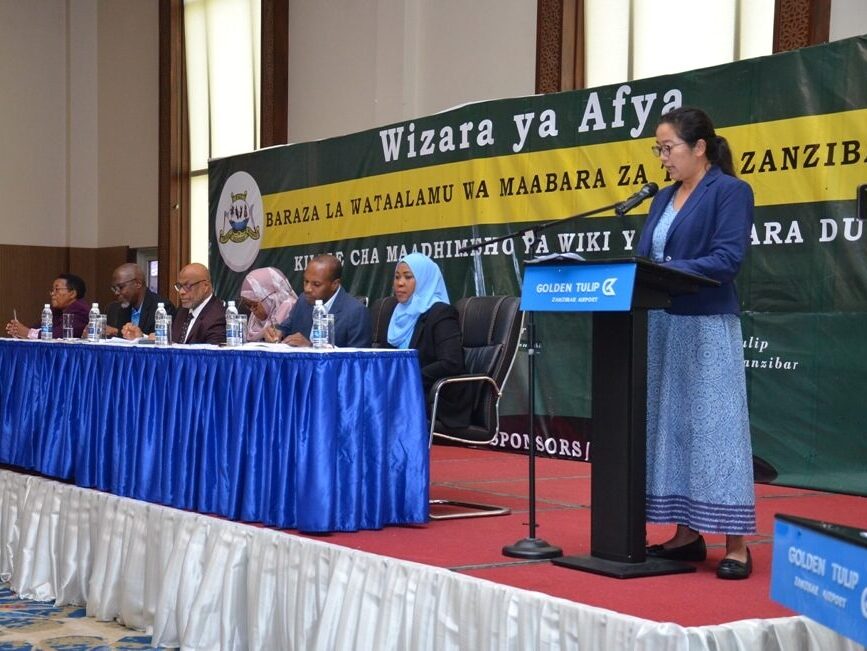With the global COVID-19 pandemic still fresh in mind, and future pandemics and more localized epidemics an ever-looming threat, countries around the world are taking steps to increase preparedness for infectious disease outbreaks. Against this backdrop, a new set of medical laboratory policy guidelines promises to give Zanzibar a much-needed boost to its health security.
Under the Global Fund COVID-19 Response Mechanism Technical Assistance project, funded through US Centers for Disease Control and Prevention (CDC), ICAP in Tanzania collaborated with the Zanzibar Ministry of Health to support the development of new Medical Laboratory Guidelines to enable laboratory-based surveillance in Zanzibar to meet international health regulations and standards.
This transformative initiative was a fully collaborative effort. Working with a range of laboratory stakeholders, ICAP in Tanzania conducted a situation analysis on laboratory services in Zanzibar and provided the vital technical assistance that led to the development of the guidelines.
On behalf of the President of Zanzibar and Chairman of Revolutionary Council, His Excellence Hon. Dr. Hussein Ali Mwinyi, the Minister of Health of Zanzibar, Hon. Nassor Ahmed Mazrui, officially launched the Medical Laboratory Policy Guidelines on April 21, 2024 – World Laboratory Day – at an event attended by officials from the Zanzibar Ministry of Health, laboratory stakeholders, CDC Tanzania, and ICAP in Tanzania.
In his speech, the Minister of Health noted the importance of strengthening laboratories to provide quality health services provided to citizens in the areas of diagnostics, genetics, chemicals, and foods, and urged the Ministry of Health Zanzibar to effectively use the guidelines to improve and strengthen laboratory services in all aspects.
“The policy serves as invaluable guidance in steering Zanzibar towards the promotion of best practices while expanding testing capacities for data-driven surveillance critical in epidemic and pandemic preparedness,” added Dr. Mazrui.
Speaking during the event, Dr. Wangeci Gatei, director of the Division of Global Health Protection, CDC Tanzania, noted: “US CDC Tanzania is filled with optimism for the transformative impact that the Zanzibar Medical Laboratory Policy Guidelines will have on the health landscape of Zanzibar. The true measure of success lies not merely in the creation of policies but in their effective implementation and utilization. It is my fervent hope that the Zanzibar Medical Laboratory Policy Guidelines will serve as a beacon, guiding policymakers, health care professionals, and stakeholders alike in their efforts to uphold the highest standards of laboratory practice and public health.”
“ICAP in Tanzania is collaborating with the Ministry of Health Zanzibar under the Global Fund COVID-19 Response Mechanism (C19RM) Technical Assistance project to strengthen laboratory-based surveillance by developing policy guidelines, defining the role of the laboratory in surveillance activities, and developing the laboratory response network to optimize the existing next-generation sequencing capacity,” said Haruka Maruyama, MPH, ICAP’s country director in Tanzania. “The policy will establish a coherent national framework for medical laboratory services, improved quality of medical laboratory services through the implementation of quality management systems according to national and international standards, and integrated research and ethics in medical laboratory services for policy development and implementation. And it will foster partnerships and collaborations to strengthen the delivery of quality medical laboratory services.”

Zanzibar Minister of Health, Hon. Nassor Ahmed Mazrui (left) meets with Dr. Wangeci Gatei , director of Division of Global Health Protection, CDC Tanzania, Haruka Maruyama, country director for ICAP in Tanzania, and John Kahemele, deputy country director, ICAP in Tanzania.
ICAP has been working in partnership with the Ministry of Health, Zanzibar since 2003, in supporting prevention, care, and treatment of HIV as well as other infectious diseases that impact people living with HIV in Tanzania. The project known as UTAP (funded by CDC and implemented in Tanzania and other countries by ICAP from 2003 through 2011) represented a major milestone in establishing prevention services of the vertical transmission of the HIV virus from mothers to infants in Zanzibar.
“Furthermore, during difficult time of the COVID-19 outbreak, ICAP jointly worked with the Ministry of Health, Zanzibar to support event-based surveillance and Infection Prevention and Control (IPC) at point of entry, this was still possible, due to extended support of the Revolutionary government of Zanzibar, the U.S. President’s Emergency Plan for AIDS Relief (PEPFAR), the U.S. Centers for Disease Control and Prevention,” added Maruyama in her launch event remarks.
Following the official launch of the guidelines, members of CDC and ICAP in Tanzania were received by President of Zanzibar and Chairman of Revolutionary Council, His Excellence Hon. Dr. Hussein Ali Mwinyi in his office. During the brief meeting, the Honorable President conveyed his gratitude to the US government through CDC and to ICAP in Tanzania for collaborating with Ministry of Health to enhance laboratory services in Zanzibar.
At the meeting, the Honorable President resident assured his guests that the government of Zanzibar will continue to work with CDC and ICAP to enhance its preparedness and capacities to tackle public health threats by advancing both its health security and laboratory services
About ICAP
A major global health organization that has been improving public health in countries around the world for two decades, ICAP works to transform the health of populations through innovation, science, and global collaboration. Based at Columbia Mailman School of Public Health, ICAP has projects in more than 40 countries, working side-by-side with ministries of health and local governmental, non-governmental, academic, and community partners to confront some of the world’s greatest health challenges. Through evidence-informed programs, meaningful research, tailored technical assistance, effective training and education programs, and rigorous surveillance to measure and evaluate the impact of public health interventions, ICAP aims to realize a global vision of healthy people, empowered communities, and thriving societies. Online at icap.columbia.edu








